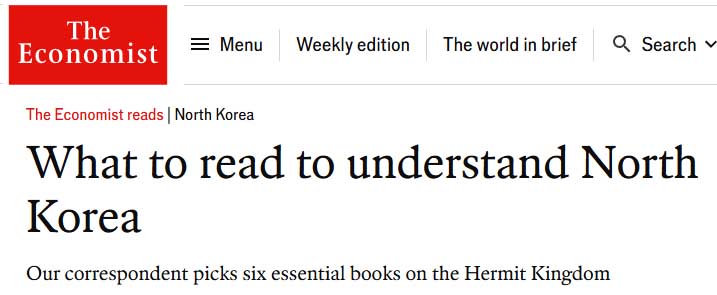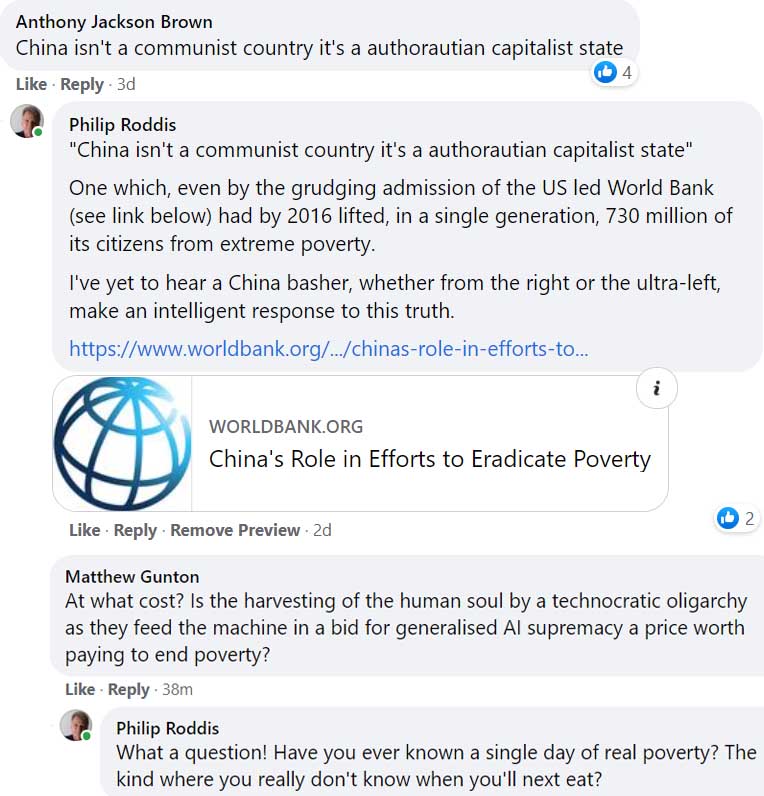
Think I’ll give those “six essential books” a swerve. Like the Guardian, The Economist can come up with good stuff on matters which don’t threaten the core concerns of the oligarchs who rule the West but, on matters which do, is an indefatigable purveyor of drivel.
Don’t take my word for it. Search its decade and then some of doomsaying China’s impending crash. Why? Because Beijing won’t do as the West – with its rotting inner cities and permanent precariat, its welfare systems at death’s door while a heap of horrors whose fixing should be the alpha and omega of economics go unfixed – counsels. To the bafflement of these geniuses, Xi and his latter day mandarins just won’t take their solid gold advice and hand over the beating heart of any modern economy, its banking sector, to the famously farsighted care of rentiers.
For more on this, see Why Read Michael Hudson?

Facebook exchange circa 2018/19 1
But back to North Korea, The Economist, and a piece whose first paragraph tells us:
For a supposedly communist state, North Korea is replete with the kind of contradictions that Karl Marx thought led to collapse. In pursuit of a paradise for the people it has engaged in brutal repression and caused mass starvation. Claiming to be the only bastion of true democracy, it passes power between generations of a family whose members regard themselves as demi-gods. Protesting against the threat posed by the outside world it has developed some of the most deadly weapons ever created. And guarding its privacy from outside eyes, the regime permits itself to spy on every aspect of its citizens’ lives. Here are six books that help to uncover what it tries to keep hidden.
Let me unpack.
For a supposedly communist state, North Korea is replete with the kind of contradictions that Karl Marx thought led to collapse …
Marx offered few details on a communist society – “from each according to his means, to each according to his needs” – too far in the dim and distant to foretell, but a great deal on those of capitalism and socialism. What is clear in his writings and, until Stalin declared the Soviet Union could wait no longer for the West to make its own revolutions, those of Lenin, Luxemburg et al is that not only can communism not exist in one country. Neither, in an imperialised world, can socialism as defined by social ownership of all the key sectors of wealth creation.
… In pursuit of a paradise for the people it has engaged in brutal repression and caused mass starvation …
I recently wrote a post, Stupid arguments for genocide, in which I threatened that:
One day I’ll post at length on stupid arguments to make political points. Perverse attributions of causality 2 will get top billing … An exodus of refugees from Venezuela is blamed on “failed Chavism”, much as the Vietnamese “boat people” of half a century earlier were “fleeing failed communism”. In neither case, according to the narrative writ large by our systemically corrupt corporate media, did Washington’s lethal sanctions – of the kind which condemn millions to starvation and killer diseases, and punish any third party country unwise enough to trade – have anything to do with it! 3
Not only did the US of the 1950s boast of its rabidly genocidal intent to bomb North Korea “into the stone age” (all mouth and no trousers, it succeeded in destroying merely 80% of NK towns and cities). Since then its sanctions on that country have been more relentlessly and vindictively exhaustive than those on any other. Even Iran – the realpolitik of its deals with the Great Satan as embarrassing, when the truth came out, to the Ayatollahs as to the Reagan Administration – was never so isolated.
Claiming to be the only bastion of true democracy, it passes power between generations of a family whose members regard themselves as demi-gods …
This judgment silences many a Western critic of our own set-up for the simple reason that even they take “democracy” at face value or not far short of it. It may be flawed, they say, but are with Churchill on its being “the worst possible system except for all the others”. Yet some are waking up to the truth that those we elect to high office are not the real wielders of power. In Let’s Stop Pretending America Is A Functioning Democracy, Chris Hedges wrote:
Those who wrote trade deals to profit from unemployment and underemployment of U.S. workers and sweatshop labor overseas are omnipotent. The insurance and pharmaceutical industries that run the healthcare system for profit instead of health are omnipotent. The intelligence agencies that carry out wholesale surveillance of the public are omnipotent. The courts that reinterpret laws to excuse corporate crimes are omnipotent.
Politics is spectacle, a tawdry carnival act where a constant jockeying for power by the ruling class dominates the news cycles, as if politics were a race to the Superbowl. The real business of ruling is hidden, carried out by corporate lobbyists who write the legislation, banks that loot the Treasury, the war industry and an oligarchy that determines who gets elected and who does not. It is impossible to vote against the interests of Goldman Sachs, the fossil fuel industry or Raytheon, no matter which party is in office.
For my part, in Broken: the implicit contract between rulers and ruled, I wrote:
… in 2023 Michael Hudson published The Collapse of Antiquity. It advances a simple thesis. In the early civilisations of Sumer, it explains, a new king would start his reign by cancelling debt. Why? Because interest on debt rises exponentially while wealth production – from which debt is paid – can at best rise logarithmically. The inexorable logic is therefore for power to accrue to a creditor oligarchy. The forgiveness of debt derailed this tendency, but the new king had to be powerful enough to force it through. To put this in today’s terms, he had to be the very thing liberals (labouring under the delusion that ours is a democracy rather than a creditor oligarchy) condemn in a Vladimir Putin or Xi Jinping.
He had to be An Authoritarian. How else could the king break the destructive – and ultimately self destructive – power of the oligarchs? It was their failure to do this, Michael argues, which brought down the civilisations of Greece and Rome: collapsing as they did under the weight of debt which could not be repaid but would not be forgiven. [emphasis added]
Protesting against the threat posed by the outside world it has developed some of the most deadly weapons ever created …
Does anyone who (a) is aged ten or over and (b) has actually thought about these matters on the basis of a materially informed study of historical evidence believe North Korea would not have been regime-changed and asset-stripped long ago but for its nuclear status?
And guarding its privacy from outside eyes, the regime permits itself to spy on every aspect of its citizens’ lives.
Patriot Act anyone? In one of life’s quieter ironies, a core reason for my rejecting the infantile pipe dream of socialist revolution in the West is its mass surveillance capability. In a footnote to a post last month on China’s EV dominance I wrote:
The far left’s refusal to distinguish on the one hand China’s state-monitored industrial capitalism, its big banks firmly outside the private sector; on the other the usurping of state control by the West’s oligarchs, leads it to dismiss China as a progressive force. Rather, crying plague on China and the West both, it embraces (or pays lip service to) a fantasy of violently overthrowing capitalisms armed to the teeth, versed in all the dark arts, and wielding tools of surveillance beyond the wildest dreams of the 20th century totalitarianisms. This, moreover, in a West whose export of industry has eroded the very socialising conditions – an exploitation experienced en masse in the huge dark Satanic mills of Marx’s day – which led him to see the proletariat as the only force with both the means and the motive to take humanity into socialism. [emphasis added]
Here are six books that help to uncover what it tries to keep hidden.
Yeah, right …
Knowing of my wish to visit NK, until recently closed to tourists, Jackie told me last night it’s opened up again. Watch this space.
* * *
- I subsequently saw one far left writer, a man known to and respected by me, attempt to address China’s astonishing achievement while condemning its ‘imperialism’. How? By saying those 800+ million (an extrapolation from the World Bank figure from 2016) had been raised from extreme poverty at the expense of other global south nations. Oddly, he neglected to set out the mechanisms by which 800 million people elsewhere had been cast into extreme poverty to balance the books!
- Those “perverse attributions of causality” depend vitally on the lies of omission by which our systemically corrupt media manufacture opinion. If nothing is said of Washington’s genocidal war on “communism” in the ’50s, nothing of its lethal “sanctions”, then, yes, it makes perfect sense to blame the suffering of disobedient states in the global south on local leaders. Thus are we rendered politically asinine.
- A more comprehensive response, prompted seven years ago by the “universalism” of otherwise good writers sorely misled on Syria, to the “brutal repression” charge can be found in Monbiot, Syria and universalism.

Evidently Mr Gunton prefers the Western approach to poverty, which is to deliberately increase and then punish it, as Rachel Reeves seems determined to do.
As Rachel Reeves intends to do indeed. Like me, you follow Richard Murphy. He’s blind as a bat on so many important matters but, on Starmer-Labour mismanagement – or as I’d say, prosecution of class war on behalf of the rentier oligarchs – he’s been spot on.
Voices like his should be heard alongside those with a larger perspective. Like Michael Hudson, Radhika Desai and Naked Capitalism (which sometimes recycles posts by Richard).
Entirely agree!
Your reports from north Korea would/will be of great interest. Take the train from Russia- and blog as you go.
I am making an assumption here, but if you used to post on MoA I would like to say how glad to see you are okay. Your comments are missed.
No mistaken identity here. You got the right guy, Inga
Splendid idea. It’ll likely by costlier but if I find it affordable, I’ll do just that.
As a Yorkshireman, you might be pleasantly surprised at the rail fares in Russia.
Part of an escorted tour back in 2017 involved the 700km (in four hours) Moscow – St. Petersburg rail journey. Granted, this was single rather than return. However, even us Yorkshiremen (who are just Scotsmen with every ounce of generosity squeezed out of us) cannot do the “How much! Bleedin ‘ell!'” routine at a 400 mile rail trip for just under £20 (Senior citizen rate).
This gets better and better…
I’m on the case …
Wow – you’ll get some great photos.
Wish I could do this too
Camera and lenses will be top of my packing list, Jams